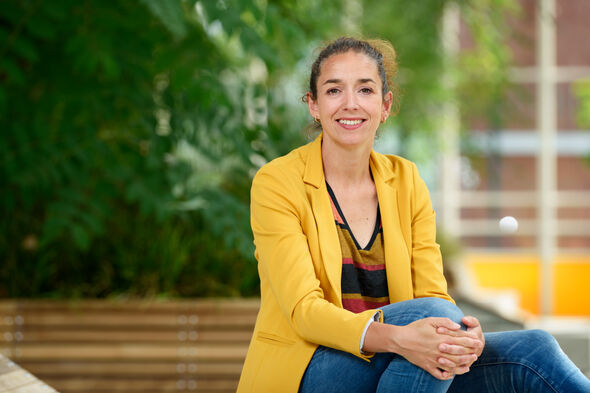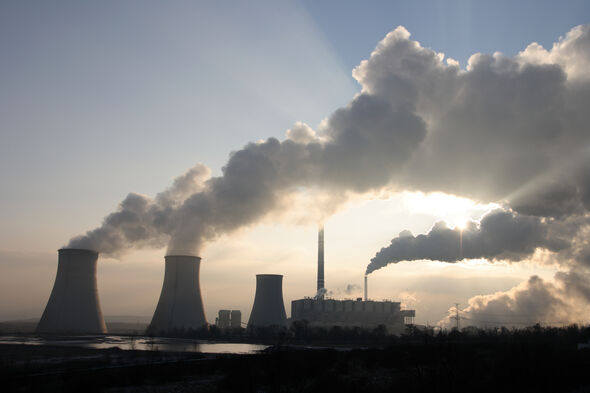
Energy in abundance
Fanatical about energy and sports, Laetitia Ouillet is the only university representative at the ‘sector tables’ where decisions are made about how the aims of the Climate Agreement can be achieved. She fulfils the role with dedication, as you would expect of someone who spends her leisure time doing ultra running in the Alps. “First a marathon round the mountain before crossing over the summit.”
Her work for the sector table occupies one day a week in principle, just Fridays, explains Laetitia Ouillet. The driving force behind TU/e's Strategic Area Energy sits at the sector table for Electricity in her capacity as representative of the Netherlands Energy Research Alliance. “But in practice I've been occupied with the Climate Agreement 24/7 since March. I lay awake last night worrying about the document section on innovation that our sector table has to submit.”
She feels responsible for the section, which should create sufficient leeway for research on technologies that will show a return only after 2030. “The sole aim of the Climate Agreement is to halve the emission of greenhouse gases in 2030 compared with 1990. But obviously you must look beyond that horizon.”
Before summer all five sector tables (Industry, Mobility, Built Environment, Agriculture and Land Use, and not forgetting Electricity) must submit their plans, so that over the summer the Netherlands Environmental Assessment Agency can crunch the numbers. The policy is due for implementation in 2019. “Once this job is done and dusted I think I'll take four months' vacation,” sighs this French-born citizen with some pathos.
Work horse
Before joining TU/e two years ago, Ouillet spent fifteen years working in the electricity sector, at Nuon, Eneco and elsewhere. Electricity is a vital link in the negotiation process, she explains. “It is the work horse for the other tables: ultimately the reduction in CO2 will have to be achieved largely by generating much more renewable electricity.” The energy sector alone must cut its emissions by more than 20 metric megatons of CO2 a year by closing coal-fired power stations and fully committing to wind and solar power.
In her view, the most important contribution must come from large offshore wind parks. “Thanks to developments made in recent decades, a new public tender for this, involving no subsidies, has been launched recently. So it's entirely possible. In addition we have to install many more solar panels. Why aren't all our business parks already full of them? In China they recently had to halve the government subsidy scheme because they couldn't keep up with the increasing supply of solar power. We are still a long way from achieving that here, unfortunately.”
Ultra runner
In any event, this is keeping her very busy. So busy that her social life – partner, children, friends – are suffering. “The only thing I've not cut down on is sport. To put it simply, I need it to stay mentally healthy,” she says laughing. And that is not just an hour in the gym or on the tennis court twice a week; Ouillet is an ultra runner. Someone whose engine only starts to warm up when the finishing line of the marathon comes into sight. “Every year I set myself a goal,” she says. “Last year it was a run at Davos over 78 kilometers. First a marathon round the mountain before crossing over the summit.”
Major prizes no longer lie in store for her, now that she is approaching forty, but she has no shortage of talent. “Really, I discovered too late in life that ultra running is the ideal sport for me. Only five years ago I wondered whether I should start training really seriously. I was starting to win some minor competitions, you see. But anyhow, it only means winning a voucher for Intersport worth 25 euros. And it takes up so much time!”
Running coach
In her life she has no time for TV or Netflix. But then she has no patience for them anyway. Ouillet simply isn't equipped for passive consumption. After an hour she's had enough and is heading off to put on the washing or start WhatApping. “It may be that I have a mild form of ADHD. My stepdaughter can spend an entire weekend binge watching and eating potato chips. I've got a headache after an hour and want to go outdoors!”
As well as her work as the driving force behind TU/e's Strategic Area Energy, this sports enthusiast is also a digital running coach capable of inspiring others with enthusiasm. An activity she does through her site www.ikbeginvandaag.com. “But it's only a teeny tiny company, you know. Me, myself, and I. But, yes, I advise people who are keen to take up running but who are not at all sporty. First off, I go running with them a couple of times, to show them the technique, and afterwards I draw up training programs for them, tailored to their specific needs. Last year I even had a small training group. We ran on Saturdays and in a year we went from zero to 10 kilometers. I love this work, it's fantastic.”
French
Anyone speaking to her could easily forget it due to her perfect Dutch, but Ouillet is French and came to the Netherlands only in 2001. She grew up as the daughter of a steward and stewardess of Air France. “Five months of the year I lived in Florida, which is why I now speak better English than French.”
She studied econometrics, first in France, later in England. A job at Ecofys brought her to the Netherlands, but her chief motivation for relocating was that her best friend had started a romance with a Dutchman and was leaving for the Netherlands. Her Dutch may seem good but by her own admission she still finds it difficult to find the right register. “My partner says that I cut across every social group when I speak; you'll hear slang littered with phrases as if I were Beatrix herself,” she laughs.
“As soon as I came to the Netherlands, I and my best friend had six Dutch lessons with an English woman who had married a Dutchman. There I learned to count and came across expressions like ‘effe flappentappen’ (to quickly get money from the cash machine) and ‘ik zag twee beren broodjes smeren’ (I saw two bears making sandwiches; a children's song). They went down well at parties.” After six months at Ecofys she was required to learn Dutch. A little while later she met a Dutchman and had a much more pressing reason to devote her energies to mastering the language.
Monomaniac
Her passion for energy began when she was at high school in France and did a project on the liberal energy market in the United Kingdom, at the time considered revolutionary. Since graduating, she has always worked in the energy sector, like her partner and her ex-partner before him. She is pretty monomaniacal about energy; for example, it is the only thing she reads about, she says.
That many developments in the energy sector depend heavily on the power of the government to get things done clashes somewhat with her natural impatience. It is something she finds frustrating. “You have to manage the energy transition on a big scale, and that is at odds with the Dutch polder culture. The way I see it, we should be going full tilt at converting renewable electricity into CO2-neutral fuels. Here in the Netherlands we have a fabulous infrastructure for electricity and gas, and an advanced chemical industry to boot.”
We need to make use of that, believes Ouillet, but the Dutch government isn't sticking its neck out and is leaving everything to the market. Which means simply not enough is happening. “In countries like Germany or France it is different. And it used to be different here too: when natural gas was discovered in Groningen, the entire gas network was rolled out within a couple of years. Entirely from scratch.”
(Text continues below picture)
Back to the sector table: Ouillet is receiving plenty of knowledge-based support from the departments, she says. “Obviously I don't know everything so I consult a great deal with, among others, Emiel Hensen, Philip de Goey and David Smeulders. The other day I sent an email late in the evening to Emiel, and by the next morning at breakfast I had a detailed answer and was able to move forward. Where the Strategic Area is concerned, I often feel like a general without an army, but it is wonderful that experts like these are so willing to help me. Every day I go to bed feeling a little bit smarter than when I got up!”




Discussion